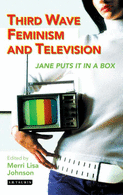
The answer, writes sociologist Virginia Rutter (pictured left), author of The Gender of Sexuality, may surprise you. Here’s Virginia:
I’m pondering the results in Iowa, thinking about numbers, and continue to feel so troubled by the misogynistic responses to Hillary Clinton. When I got the idea–just recently, listening to Bill Moyers interview Kathleen Hall Jamieson on politics and the blogosphere–of how aggressive the remarks about Clinton are, I had this duh moment that reminded me (not to be too dramatic) of when my husband died.
See, my husband died 9 years ago, but my brother had died 14 years before. When my husband died, I was like, “shit I forgot that people you love can die.” And when I started figuring out what was going on with Clinton, I was like, “duh I forgot just how much people hate women who lead and take charge.” It is that fundamental, I am afraid to say.
The issue is gender identity politics. Not gender politics, like whether a candidate is concerned with family leave, which continues to be a concern of women more than men, for example, but gender identity politics, the politics of feeling like a man or a woman is in a role or status that we’re comfortable with. When Clinton is called “that bitch” that is a good signal that it isn’t about policy, but about identity politics.
Mind you, seeing Barack Obama win is great for the election, because it keeps the pressure on all around. But there is something else going on, and commentators keep acting like concerns about gender are baloney. “Get over it. 35% of women voted for Obama versus 30% for Clinton.” But those numbers do not tell us anything about how voters are responding to gender. They just tell us that the people of Iowa like Obama more than Clinton. What I want to know is what are men doing. Men have gender too, you see.
So the question is this: are men (or women) more likely to vote their gender? The NYTimes provides a profile of caucus voters. I’m a quantitatively oriented sociologist who studies gender, and before I looked in detail at the numbers I thought what I was hearing was that men were voting their gender, and women were voting neutrally–that we women were as likely to vote our gender as not. But the results are a little different: men are more likely to vote their gender, and women vote their gender, too, but less so than do men.
Here’s how it works. First, of course in Iowa men had more opportunity to vote their gender than women did, what with 6 men on the ballot. But if we just compare Obama and Clinton, we see that men and women voted for Obama about 55% of the time and that they both voted for Clinton about 45% of the time. (How did I get this? 34% is what Obama got and 27% is what Clinton got; if you add those two together, 55% is the share that belongs to Obama, and 45% is the share that belongs to Clinton.)
Given that distribution, here’s what we know about “voting one’s gender” in Iowa: Out of all the men who voted for either Obama or Clinton, 60% of those were for Obama–that is men voting for a man. Men voted their gender 5 percentage points more than we would expect if their voting weren’t influenced by their gender. Meanwhile, out of the women who voted for either Obama or Clinton, 46% of those were Clinton supporters–that is women voting for a woman. This means that women voted their gender more than we would expect—but only by 1 or 2 percentage points.
What does this mean? Well these are not dramatic differences, but they are a trend. Gender identity is a factor in this election–and I believe men’s hidden biases (and not so hidden in the crassly expressed attacks on Clinton) against women are playing a role. This doesn’t mean that women are morally superior; it doesn’t mean that Clinton is secretly the better candidate because she is a woman. It means that you should pay attention to what men are doing not just what women are doing. It means that you should speak up and say “not so fast” when commentators or your colleagues or your dinner companions dismiss gender identity politics as a meaningful factor in the democratic primaries. Because it is.
-Virginia Rutter is a sociology professor at Framingham State College (MA). vrutter@frc.mass.edu.
 I’m back in the city after a few delicious days away (thank you, Woodhull!) and, in the spirit of catching up, wanted to share a link, courtesy of Marci Alboher at Hey Marci:
I’m back in the city after a few delicious days away (thank you, Woodhull!) and, in the spirit of catching up, wanted to share a link, courtesy of Marci Alboher at Hey Marci:







